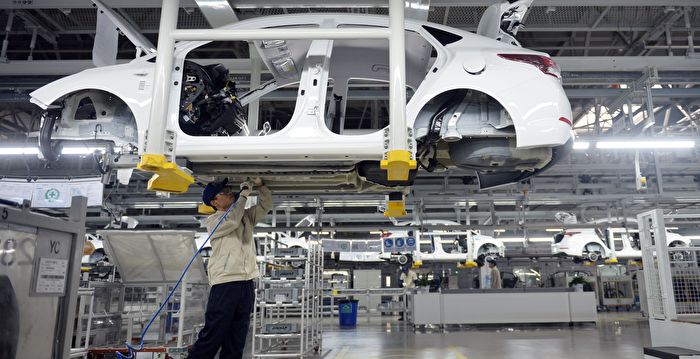[Epoch Times September 12, 2021](Epoch Times reporter Li Bing comprehensive report) The chip shortage crisis in China’s auto industry has not only not been alleviated as expected by the industry, but has intensified over time. In response to the “core shortage”, the Chinese Communist Party recently imposed fines on three auto chip distributors on the grounds of driving up prices.
On September 10, three auto chip distributors, Shanghai Qiante Electronics Co., Ltd., Shanghai Chengsheng Industrial Co., Ltd., and Shenzhen Yuchang Technology Co., Ltd., were fined by the Chinese Communist Party for “raising the price of auto chips”.
According to official surveys, since the beginning of this year, the price of chips sold by Chinese auto chip manufacturers and authorized agents has increased by 10% to 15%, and individual chips have increased by 50%. Some domestic vendors and hot money groups rush to buy chips, causing the prices of some car chips to continue to rise, some by 3-10 times, and some by 30-40 times.
The officials fined the three distribution companies of Shanghai Qiante, Shanghai Chengsheng and Shenzhen Yuchang a total of 2.5 million yuan.
Affected by the shortage of auto chips, China’s auto production and sales have fallen for four consecutive months since May.
On September 10, data from the China Automobile Association showed that in August, the production and sales of automobiles were 1.725 million and 1.799 million, a decrease of 7.4% and 3.5% from the previous month, and a decrease of 18.7% and 17.8% from the same period last year.
Toyota, Audi, GAC Trumpchi, Great Wall Motors, and many other auto sales staff told the China Securities Journal that new cars are scheduled for at least one and a half months before they can be picked up. Some models and even one car are hard to find. This year’s “Golden Nine and Silver Ten”, the auto market will not have too many concessions, some cars are more expensive than last year’s 20,000 to 30,000 yuan. The impact of the chip shortage on the domestic automobile industry is expected to continue until next year.
Just last month, in response to issues such as high car chip prices, the CCP’s CCTV Finance issued a warning, stating that core speculators should immediately “stop the precipice” and that the State Administration of Market Supervision would “make a move when it is time to make a move.” Subsequently, A-share semiconductor chip stocks plummeted.
However, one of the “causes” of the sharp rise in China’s automotive chips is related to the epidemic.
According to China Business News, in mid-August, Xu Daquan, Executive Vice President of Bosch China, announced in Moments that a semiconductor chip supplier’s Muar factory in Malaysia was shut down by the local last night due to the new epidemic. The government closed some production lines until August 21. Bosch ESP/IPB, VCU, TCU and other mainstream automotive chips will be directly affected, and it is expected that the supply will be basically out of supply in August.
German Bosch company (Bosch) is China’s largest ESP supplier. Car companies such as BMW Brilliance, FAW-Volkswagen, Changan Automobile and Great Wall Motor mainly use Bosch ESP systems. In late August, an insider of Anhui Chery Automobile told reporters: “Bosch ESP is close to being out of stock.”
As a leading company in the automotive industry, FAW-Volkswagen has a huge production and sales volume. It mostly chooses large global parts suppliers such as Bosch and Continental for supply. The “core shortage” crisis is the first to be revealed in these parts suppliers with huge output.
In addition to FAW-Volkswagen, Chinese joint ventures such as Honda and Nissan have also experienced substantial production cuts caused by chip shortages. The latter is mainly affected by chip companies such as Japan’s Renesas. Although the production cut is later than FAW-Volkswagen, the impact is also very serious. The output of Guangqi Honda and Dongfeng Honda in June and July of this year both decreased by more than 40% year-on-year.
A person from Dongfeng Honda said that some of the company’s main sales models have even reduced production by 80%.
Editor in charge: Sun Yun #
.
